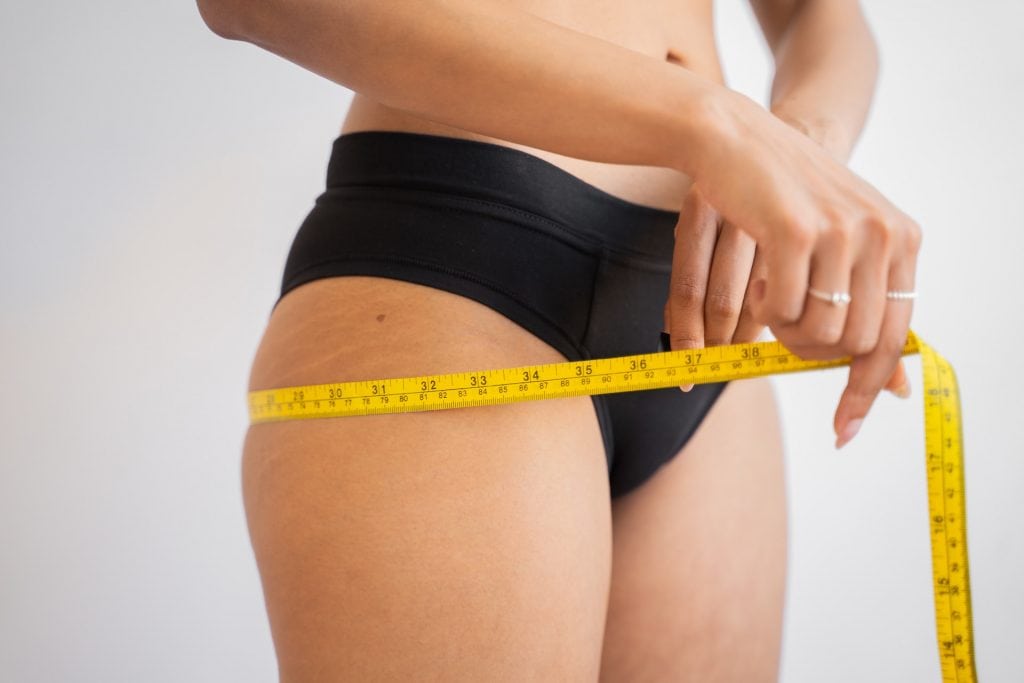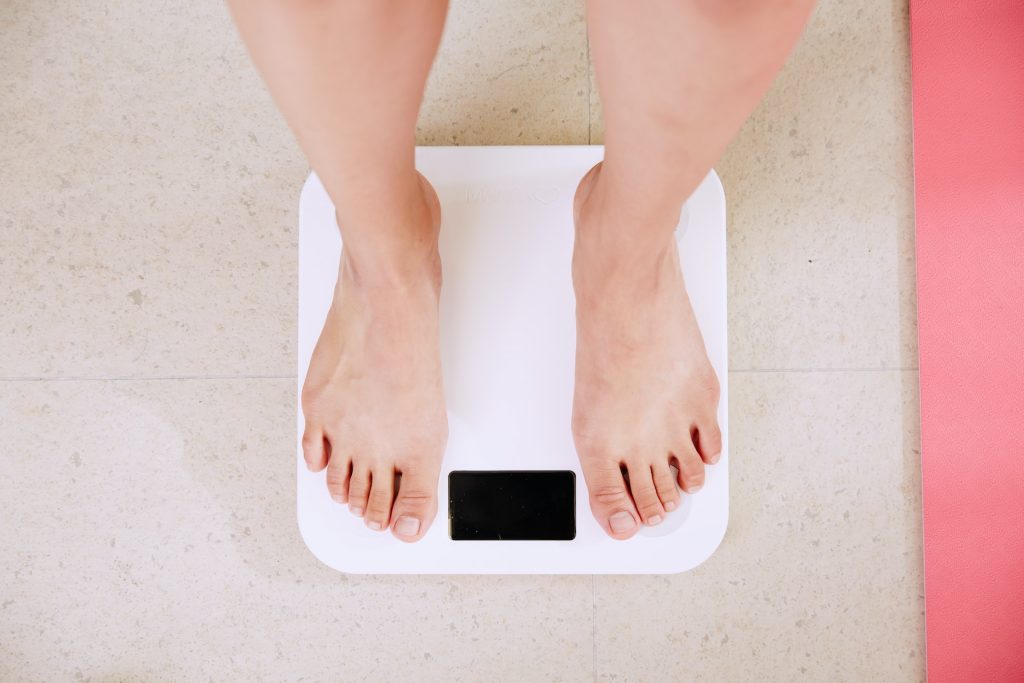Are you losing inches but not weight? I know this is frustrating but it is 100 percent normal.

Standing on the scale isn’t the most effective way to measure your weight loss goals, and just because the number on the scale stays the same, doesn’t mean you’re not making progress.
So in this post, I will be covering six reasons why you might be losing some inches but not weight and what you can do about it.
You are losing water weight
The most common reason for losing inches but not weight is water retention. When you lose weight, you retain a lot of fluids. You can lose up to five pounds in the first few weeks of working out and then stop suddenly.
If you don’t realize that this is all water weight, you will be frustrated when you stop losing weight.
During this time, people think their diet or training principles aren’t working, and they quit.
So if you lose a lot of weight at the beginning of your weight loss journey and it stops unexpectedly, understand that this is normal.
You are building muscle

The problem with scales is that they weigh your entire body, not just your body fat.
This is another reason to lose inches, but not weight. You’re building muscle and losing fat at the same time, and since muscle is heavier than fat, a little muscle can add to your body weight.
This is a good thing because overall health is about more than just a number on a scale.
also, Research has shown These muscles can help you lose weight. It doesn’t directly burn fat, but carrying more muscle raises your body’s resting metabolic rate, making fat loss easier.
So although it may be tempting to cut down on resistance training to lower your weight, a better long-term approach is to combine weight lifting with cardio and a clean ketogenic diet. This promotes good body composition.
You have reached a weight loss plateau
A weight loss plateau is bad, but it happens to all of us as our bodies get used to our training routines and eating habits. The best way to combat this is to reassess your habits and see if there are any areas where you are slowing down. For example, maybe your cheat meal has too many calories, or you miss days at the gym.
From here, create an action plan where you solve these issues. Maybe you can implement a tasty diet plan where you don’t need a cheat meal. Or maybe you could start running a few miles each morning.
Another way to overcome a weight loss plateau is to cut calories. If you’ve lost 30 pounds, but your caloric intake is still the same as when you started your weight-loss journey, you can expect a slowdown in progress. Instead, cut calories and see if you keep losing weight.
Increase your bone density

Most people don’t realize it, but when you start exercising, you increase your bone density, which greatly contributes to weight gain.
Your bone density is the number of minerals in your bones Medical papers appear Strong relationship between bone density and weight gain.
But increasing bone density is healthy because it reduces injuries and improves posture. can even Reducing the possibility of osteoporosis later in life.
It is hard to know if your extra weight is due to your bone density. But if you’ve been working out for a while and notice that your joints aren’t experiencing the usual soreness, there’s a chance that your bone density may have contributed to your weight loss plateau.
You get sore while training
If you’re just starting a new exercise routine, inflammation training may be another reason to lose inches, not weight.
Training inflammation occurs when you do high-intensity exercises. Your muscles suffer from micro-tears, also known as exercise-induced muscle damage, and this helps your muscles grow by stimulating inflammation.
However, this inflammation causes your body to increase water weight, which increases body weight by a few pounds.
Fortunately, weight gain due to inflammation is only temporary and should go away as your body gets used to your workouts.
You weigh yourself inconsistently

Your body weight fluctuates during the day depending on factors such as food intake and water retention.
For the most accurate results, weigh yourself at the same time. I like to weigh myself first thing in the morning because I don’t have anything in my stomach. However, the time does not matter as long as you consistently weigh yourself at the same time each day.
I also noticed that your weight can change depending on where you put the scale. The material and angle of the floor can add or remove a few pounds. So always weigh yourself in the same area.
What should I do instead?
Here are two tips you can use if you are frustrated with losing inches but not weight:
- Stop weighing yourself every day
- Keep training and staying healthy
Stop weighing yourself every day
The most common reason people find themselves losing inches but not weight is because they weigh themselves daily. If you were expecting to see a difference on the scale after a few days, you’ll be disappointed that losing weight doesn’t work that way.
Some days you will notice significant weight loss, while on other days, you will gain weight.
So I suggest you weigh yourself every two weeks to avoid getting hung up on small weight fluctuations.
Keep training and stay healthy
Many dieters lose inches but not weight, think they are not making any progress, and stop. This is the biggest mistake you can make because you are making progress; Scale just can’t catch it.
If you’re thinking of giving up, know that if you’re eating in a calorie deficit and hitting the gym a few times a week, you’re making progress. Consider using an alternative measure of weight loss such as body fat percentage or progress photos. It will keep you motivated when the number on the scale is off.
Alternative methods of measuring weight loss
Weighing yourself isn’t the only way to track weight loss progress. In fact, it is one of the most inaccurate methods because it is prone to water retention and muscle mass gain. So instead of obsessing over your body weight, choose these alternate weight loss measurements:
- Body fat percentage measurement
- See how your clothes fit
- Take progress photos
Body fat percentage measurement
Measuring your body fat percentage is the best way to know if you are losing fat. Body fat measurements are not subject to water retention or increased bone density or muscle mass.
The most convenient way to measure your body fat percentage is with a body fat measuring device. These tools only cost a few dollars, and you can get them at your local drugstore. But although it is an accurate way to measure body fat, it does require some skill and knowledge. If you don’t know how to use it properly, it can produce inconsistent results.
So if you are looking for a more accurate reading, use DEXA scans. This determines your exact body fat percentage, and there are almost zero margins for error. Also known as hydrostatic weighing, DEXA scans happen when you’re submerged underwater to measure the density of your body fat.

See how your clothes fit
You can also measure progress by clothing size. If you’ve been losing inches but not losing weight, you’ll notice that your clothes will fit more, even if your weight stays the same.
So if you’ve been working out for a few months and slipped from size 14 to size 12 jeans, use it as motivation because you’re smashing your weight loss goals.
Take progress photos
A final alternative to weighing yourself is to take progress photos every three weeks because it allows you to see how your body has changed over a long period of time. You may not see a difference by looking at yourself in the mirror daily. But if you compare your physique to a few months ago and notice a positive change, you are making progress.
Final thoughts on losing inches but not weight
The most common reasons people lose inches but not weight is water retention, increased muscle mass or bone density, plateauing weight loss, or you weigh yourself infrequently.
If you’re losing weight but not inches, consider switching the weight loss measurement. The weight scale does not affect muscle mass and water retention, so try measuring your body fat percentage, taking photos of progress, and seeing how your clothes fit.